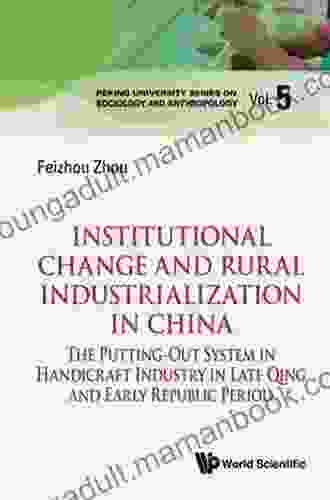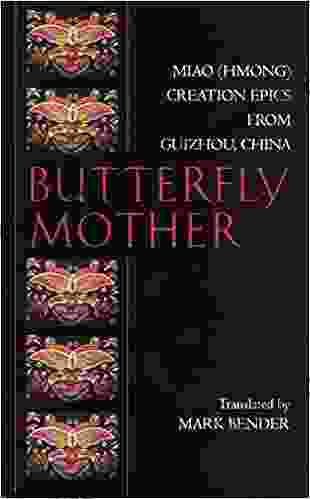Institutional Change and Rural Industrialization in China: A Comprehensive Analysis

Institutional change has played a profound role in the remarkable economic transformation of China over the past few decades. This article investigates the nature of these institutional changes, their impact on the rural economy, and the challenges and opportunities that arise in their wake.
4.6 out of 5
| Language | : | English |
| File size | : | 5458 KB |
| Text-to-Speech | : | Enabled |
| Screen Reader | : | Supported |
| Enhanced typesetting | : | Enabled |
| Word Wise | : | Enabled |
| Print length | : | 203 pages |
Institutional Changes and Their Impact
Institutional change in China's rural sector has taken various forms, each contributing to the process of industrialization:
- Land Tenure Reform: The dismantling of the traditional collective farming system has given farmers more autonomy and incentives to invest in land and agricultural production.
- Property Rights and Market Liberalization: The establishment of clear property rights has encouraged private investment in rural areas, fostering the development of agricultural and manufacturing enterprises.
- Rural Labor Market Reforms: Relaxed restrictions on labor mobility have allowed surplus labor from the agricultural sector to transition to non-farm employment, stimulating rural industrialization.
- Financial Market Reforms: Improved access to credit and financial services has provided rural entrepreneurs with the necessary capital to invest in industrial activities.
- Infrastructure Development: Investments in roads, electricity, and communication networks have reduced transaction costs and facilitated the integration of rural areas into national and global markets.
Benefits of Rural Industrialization
The institutional changes outlined above have significantly contributed to the following benefits of rural industrialization:
- Increased Income and Poverty Reduction: Industrialization has created new employment opportunities and raised incomes in rural areas, reducing poverty rates.
- Improved Agricultural Productivity: Industrialization has provided farmers with access to modern machinery, inputs, and technology, boosting agricultural productivity.
- Reduced Urban-Rural Gap: By creating economic opportunities in rural areas, industrialization has narrowed the income and development gap between urban and rural China.
- Diversification of Rural Economy: Industrialization has diversified the rural economy, reducing dependence on agriculture and creating more resilient livelihoods.
Challenges and Opportunities
Despite its transformative impact, rural industrialization in China faces a number of challenges and opportunities:
Challenges
- Skill Shortages: Industrialization requires a skilled workforce, posing a challenge as the rural labor force often lacks the necessary training and education.
- Environmental Degradation: Rapid industrialization can lead to environmental problems, such as air and water pollution, if not properly managed.
- Inequality: Industrialization can exacerbate income inequality between those who benefit from industrial employment and those engaged in agriculture or other traditional activities.
- Migration and Social Disruption: Industrialization can lead to migration from rural areas to urban centers, potentially disrupting family and community ties.
Opportunities
- Technological Innovation: Industrialization provides a platform for technological innovation in both agriculture and manufacturing, leading to further productivity gains.
- New Markets: Industrialization can create new markets for agricultural products, expanding opportunities for farmers.
- Sustainable Development: Industrialization can be guided towards sustainable practices, promoting environmental protection and reducing resource depletion.
- Globalization: Industrialization enhances China's competitiveness in global markets, creating opportunities for export-oriented enterprises in rural areas.
Institutional change has been a driving force behind rural industrialization in China, transforming the rural economy and creating significant benefits for its people. However, this process also presents challenges and opportunities that require careful management. By addressing these challenges and harnessing the opportunities, China can further promote sustainable and inclusive rural industrialization, contributing to the country's continued economic prosperity and social development.
4.6 out of 5
| Language | : | English |
| File size | : | 5458 KB |
| Text-to-Speech | : | Enabled |
| Screen Reader | : | Supported |
| Enhanced typesetting | : | Enabled |
| Word Wise | : | Enabled |
| Print length | : | 203 pages |
Do you want to contribute by writing guest posts on this blog?
Please contact us and send us a resume of previous articles that you have written.
 Top Book
Top Book Novel
Novel Fiction
Fiction Nonfiction
Nonfiction Literature
Literature Paperback
Paperback Hardcover
Hardcover E-book
E-book Audiobook
Audiobook Bestseller
Bestseller Classic
Classic Mystery
Mystery Thriller
Thriller Romance
Romance Fantasy
Fantasy Science Fiction
Science Fiction Biography
Biography Memoir
Memoir Autobiography
Autobiography Poetry
Poetry Drama
Drama Historical Fiction
Historical Fiction Self-help
Self-help Young Adult
Young Adult Childrens Books
Childrens Books Graphic Novel
Graphic Novel Anthology
Anthology Series
Series Encyclopedia
Encyclopedia Reference
Reference Guidebook
Guidebook Textbook
Textbook Workbook
Workbook Journal
Journal Diary
Diary Manuscript
Manuscript Folio
Folio Pulp Fiction
Pulp Fiction Short Stories
Short Stories Fairy Tales
Fairy Tales Fables
Fables Mythology
Mythology Philosophy
Philosophy Religion
Religion Spirituality
Spirituality Essays
Essays Critique
Critique Commentary
Commentary Glossary
Glossary Bibliography
Bibliography Index
Index Table of Contents
Table of Contents Preface
Preface Introduction
Introduction Foreword
Foreword Afterword
Afterword Appendices
Appendices Annotations
Annotations Footnotes
Footnotes Epilogue
Epilogue Prologue
Prologue Jillian Lin
Jillian Lin Lisa Gentry
Lisa Gentry Michael G Munz
Michael G Munz Heather E Schwartz
Heather E Schwartz Hrishikesh Goswami
Hrishikesh Goswami Gary Collins
Gary Collins Susan Warner
Susan Warner Robert Bancalari
Robert Bancalari Maggie Hess
Maggie Hess Peter Robinson
Peter Robinson Geraldine Moorkens Byrne
Geraldine Moorkens Byrne Summer Flowers
Summer Flowers Heinrich Hoffmann
Heinrich Hoffmann Kelle Z Riley
Kelle Z Riley Bob Blanton
Bob Blanton Marc Plinke
Marc Plinke Julia Quinn
Julia Quinn Mary Stone
Mary Stone Vitali Lazar
Vitali Lazar David Haworth
David Haworth
Light bulbAdvertise smarter! Our strategic ad space ensures maximum exposure. Reserve your spot today!
 Richard WrightFollow ·18.1k
Richard WrightFollow ·18.1k Samuel WardFollow ·12.3k
Samuel WardFollow ·12.3k Jacob HayesFollow ·19.6k
Jacob HayesFollow ·19.6k Elton HayesFollow ·18.7k
Elton HayesFollow ·18.7k Randy HayesFollow ·10.7k
Randy HayesFollow ·10.7k Ruben CoxFollow ·7.3k
Ruben CoxFollow ·7.3k Ryan FosterFollow ·13.2k
Ryan FosterFollow ·13.2k Jayden CoxFollow ·13.3k
Jayden CoxFollow ·13.3k

 Yukio Mishima
Yukio MishimaUnveiling the Zimmermann Telegram: A Pivotal Document in...
The Zimmermann Telegram, a diplomatic...

 George Martin
George MartinFearful Stories and Vile Pictures to Instruct Good Little...
In the annals of children's literature, few...

 Grant Hayes
Grant HayesJessica the Viscount Wallflower: A Tale of Transformation...
In the opulent ballrooms and glittering...

 Jerome Blair
Jerome BlairThe Economics of the Global Defence Industry: A...
The global...

 Blake Kennedy
Blake KennedyBreath of Heron - A Window into the Poetic Depths of...
In the realm of...
4.6 out of 5
| Language | : | English |
| File size | : | 5458 KB |
| Text-to-Speech | : | Enabled |
| Screen Reader | : | Supported |
| Enhanced typesetting | : | Enabled |
| Word Wise | : | Enabled |
| Print length | : | 203 pages |













